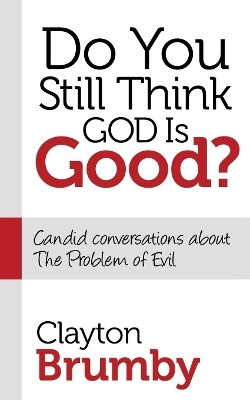
Do You Still Think God Is Good?
Candid Conversations About the Problem of Evil
Seiten
2014
Morgan James Faith (Verlag)
978-1-63047-065-4 (ISBN)
Morgan James Faith (Verlag)
978-1-63047-065-4 (ISBN)
Do You Still Think God is Good?
makes the "problem of evil" accessible to people like you and me, taking it out of the high halls of academia and into a real-world
conversation between down-to-earth but knowledgeable characters.
What is evil really?
Where does it come from?
And if God is really God, why doesn't he do more about it? This world is out of control-so violent, painful, unfair and destructive. Doesn't God care?
The Greek philosopher Epicurus is credited with saying:
Either God wants to abolish evil and cannot; or he can but does not want to; or he cannot and does not want to. If he wants to but cannot, he is impotent.
If he can and does not want to, he is wicked. But if God both can and wants to abolish evil, then how comes evil in the world?
This is known as the Epicurean paradox. Obviously, mankind has been wrestling with the problem of evil for some time; Epicurus lived between 340-270 BC.
Fast-forward twenty-three hundred years. Eric Jennings is a freshman at the University of Florida. He and his older sister, Libby, have moved in from the
mission field to enter the premed program to become medical missionaries. Eric's roommate, Todd Rehnquist, though a baseball teammate and a good friend, is
an atheist. And he poses the "problem" to Eric using an interesting quote. This sets in motion a conversation between Eric, Todd, Libby, Ray Cohen, the
Jennings' former science teacher, and Mike Murphy, a local youth minister and one of Eric's spiritual mentors. The conversation happens at an area
breakfast haunt, the Gator Skillet. Follow them as they wrestle with this most profound of issues and connect the dots. You'll find that the answers are as
simple as they are surprising.
makes the "problem of evil" accessible to people like you and me, taking it out of the high halls of academia and into a real-world
conversation between down-to-earth but knowledgeable characters.
What is evil really?
Where does it come from?
And if God is really God, why doesn't he do more about it? This world is out of control-so violent, painful, unfair and destructive. Doesn't God care?
The Greek philosopher Epicurus is credited with saying:
Either God wants to abolish evil and cannot; or he can but does not want to; or he cannot and does not want to. If he wants to but cannot, he is impotent.
If he can and does not want to, he is wicked. But if God both can and wants to abolish evil, then how comes evil in the world?
This is known as the Epicurean paradox. Obviously, mankind has been wrestling with the problem of evil for some time; Epicurus lived between 340-270 BC.
Fast-forward twenty-three hundred years. Eric Jennings is a freshman at the University of Florida. He and his older sister, Libby, have moved in from the
mission field to enter the premed program to become medical missionaries. Eric's roommate, Todd Rehnquist, though a baseball teammate and a good friend, is
an atheist. And he poses the "problem" to Eric using an interesting quote. This sets in motion a conversation between Eric, Todd, Libby, Ray Cohen, the
Jennings' former science teacher, and Mike Murphy, a local youth minister and one of Eric's spiritual mentors. The conversation happens at an area
breakfast haunt, the Gator Skillet. Follow them as they wrestle with this most profound of issues and connect the dots. You'll find that the answers are as
simple as they are surprising.
Clayton Brumby graduated from Florida State University in 1974 with a Bachelor of Science in speech communication. He spent ten years in youth ministry, both urban and high school, before entering a sales career in 1986. His articles have appeared in Touchstone (the Society of St. James) and Your Church magazine.
Preface Two Challenges
Chapter One It Always Begins with a Question
Chapter Two No Apologies Necessary
Chapter Three Inescapable
Chapter Four Alone
Chapter Five The Professor's Questions
Chapter Six The Tale of Two Timeframes
Chapter Seven Connecting the Dots
Postscript Where Do I Sign?
Appendix I: Exposing a Darwinian Straw Man
Appendix II: The Question of Dinosaurs
Appendix III: The Fall of the Angels
Bibliography
| Erscheint lt. Verlag | 30.10.2014 |
|---|---|
| Sprache | englisch |
| Maße | 127 x 203 mm |
| Themenwelt | Geisteswissenschaften ► Philosophie ► Ethik |
| Religion / Theologie ► Christentum ► Kirchengeschichte | |
| Religion / Theologie ► Christentum ► Moraltheologie / Sozialethik | |
| Religion / Theologie ► Christentum ► Religionspädagogik / Katechetik | |
| ISBN-10 | 1-63047-065-1 / 1630470651 |
| ISBN-13 | 978-1-63047-065-4 / 9781630470654 |
| Zustand | Neuware |
| Haben Sie eine Frage zum Produkt? |
Mehr entdecken
aus dem Bereich
aus dem Bereich
von Athanasius bis Gregor dem Großen
Buch | Softcover (2024)
C.H.Beck (Verlag)
12,00 €
eine Geschichte der christlichen Kunst
Buch | Hardcover (2024)
C.H.Beck (Verlag)
32,00 €


